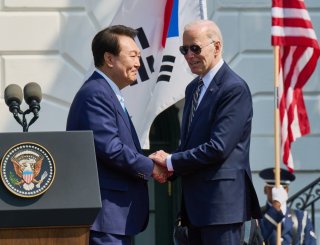Now is the Time for Washington to Prove Seoul’s Decision Right
Washington must recognize that recent diplomatic achievements with South Korea are by no means assured.
The political situation for President Yoon Suk-Yeol of the Republic of Korea is challenging due to growing domestic criticism. This comes despite, and in some respects because of, his recent diplomatic accomplishments. Considering South Korea’s political environment, Washington must demonstrate that Seoul’s decision to increase mutual defense ties with the United States and engage with Japan was the right one.
Celebrating the seventieth anniversary of the U.S.-South Korea alliance, the Washington Declaration in April marked a historical milestone. The declaration between President Joe Biden and Yoon signaled a new era of economic and security cooperation between the two states. August’s trilateral summit of the United States, Japan, and Korea reaffirmed the allies’ alignment for the region’s safety and prosperity.
The current amicable relationship between Korea and Japan, which has not appeared this rosy since the Kim-Obuchi declaration of 1998, is also noteworthy. The decision made by President Yoon to further align with the United States and Japan was not without political risks. Korea’s proximity to China and North Korea necessitates a more balanced approach toward neighboring powers. Previous Korean leaders have been cautious in taking such a dramatic step toward the United States, so they aimed to maintain a balance between the United States and China. Indeed, this was made more challenging after the trade war launched by President Donald Trump.
Korean companies have shown strong support for Yoon’s foreign policies. Samsung, SK, LG, and Hyundai have announced approximately $250 billion in investment plans since the Biden Administration. Even though U.S. trade policy became more unpredictable since the trade war with China, Korea took a further step toward the United States, hoping that more cooperation with Washington would remove uncertainties.
There is, however, a growing feeling in South Korea that Washington has not adequately responded to Seoul’s concerted efforts. Following the Washington Declaration, South Korean businesses hoped to see some progress in the U.S. trade policies that have negatively impacted Korea.
Despite constant efforts, uncertainties remain surrounding Electric Vehicle (EV) provisions in the Inflation Reduction Act (IRA) and the CHIPS and Science Act, particularly regarding their preferential credits to U.S.-based manufacturers and the binding clauses for their China facilities. Washington did not consider its allies’ perspectives when crafting its trade policies.
Those who disagree with Yoon argue that Korea’s approach to the United States is highly distorted, with much given but less taken. To make matters worse, the Japanese government elevated mutual tension in August when it released the Fukushima Nuclear Plant’s wastewater into the ocean. Yoon faces difficulty bridging opposing public opinions. The fact that Yoon won the presidential election by a slight margin of 0.7 percent highlights the immediate political pressure imposed on him. The Korean economy is also under significant strain due to rapidly shifting legacy supply chains in and out of China.
Facing this uncertain outlook, Washington should support Seoul by addressing economic issues and trade policies that have inadvertently affected it. First, Washington should expand the reach of the IRA and CHIPS Act benefits for allies. The U.S. Treasury last year made a necessary clarification by extending IRA tax credits to include leased EVs manufactured in Korea. This decision provided Hyundai the time needed to adjust its EV leasing rates from 5 percent to 30 percent before its Georgia plant, with a production capacity of 300,000 EVs, goes operational in 2025. Just as Hyundai benefited from this expansion, other Korean businesses need breathing room before their upcoming expansion in the United States.
Second, Washington should give flexibility to allies’ legacy supply chains and exports to China. The grace period, which limits semiconductor equipment sales to China, ends in October. Korea has already made substantial investments in China, with Samsung manufacturing 40 percent of its NAND Flash Memory and SK Hynix producing 40 percent of its DRAM and 20 percent of its NAND capacity there. Extending this grace period would benefit Korea and serve U.S. interests by fortifying the solid economic foundation shared by allies. Under these circumstances, Samsung and SK Hynix would be well-positioned to increase their investments in the United States, building upon their current commitment of $222 billion and leveraging their consistent performance in the global market. In addition, Seoul needs a gradual transition in its supply chain to manage the delicate relationship with Beijing, given its geopolitical situation surrounding North Korea.
Now is an ideal time to recalibrate bilateral relations before the U.S. presidential elections and Korea’s general elections next year. Cementing recent diplomatic successes requires constant effort and a willingness to dialogue. South Korean goodwill is not assured, and Washington should not take it for granted.
Yejoon Chung is a research associate at Harvard Business School and a young leader in the ‘3.0: The Next Generation of the U.S.-ROK Alliance Program’ at the Center for Strategic & International Studies (CSIS). Yejoon holds a master’s degree in public administration from Harvard Kennedy School and worked at the Korea International Trade Association (KITA). The author would like to thank CSIS, KITA, Victor Cha, Evan Ramstad, Andy Lim, Jung Koo Kang, Brian Baik, and Mark Lippert for their valuable insights.
Image: Shutterstock.

